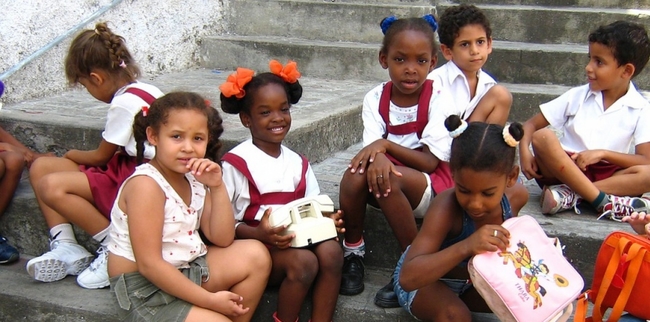Cuba's passion for education is an inspiration to all
Morning Star | Monday, 24 December 2018 | Click here for original article

FROM the very first days of the revolution education became a priority.
In 1953, around half a million or 44 per cent of children between the ages of six and 14 were without schools, only 17 per cent of 15-19-year-olds attended formal education and more than one million people were illiterate.
The situation deteriorated in the countryside. Only 7 per cent of teenagers in rural areas went to school compared to 30 per cent in Havana. At the same time 10,000 teachers were out of work. The black population, suffering from the legacy of slavery and the institutionalised racism of Spanish imperialism, fared even worse.
Despite having one of the highest rates of children attending school in Latin America in 1925, by the 1950s Cuba had dropped behind.
The regime of Fulgencio Batista did not regard the education of the children of workers and farmers as important.
The Cuban Revolution of 1959 transformed education completely.
Former army barracks were converted into schools and the new revolutionary government made the eradication of illiteracy its top priority.
The 1961 Literacy Campaign saw 100,000 volunteers organised into brigades who undertook a three week training programme before travelling to remote areas to teach rural communities how to read.
Some 10,000 primary schools were established that same year, more than had been built during 60 years of the neo-colonial republic. In 1961, Unesco declared Cuba to be the “first territory free of illiteracy,” at the time a status unique in Latin America and the Caribbean.
The campaign empowered young people to believe that they could change the world. It broke down barriers between the cities and countryside and contributed to the unity and solidarity of the revolution itself.
Cuba’s national liberation hero Jose Marti said: “The only way to be totally free is through education.” This belief that an educated people is a people empowered is core to the country’s educational achievements and critical to the vitality of the revolution.
Education remains completely free – from pre-school to post-graduate study. Around 13 per cent of the GDP is spent on education. By contrast the UK and the US spend a mere 5.6 per cent.
Everything from books and materials to school meals and uniforms is provided free of charge. What a contrast with the plight of young teachers whom I accompanied on a recent National Education Union delegation to Cuban schools. One young teacher told the Cuban students of his £50,000 debts following completion of his degree course. They were shocked.
What shone through in the visits we made were the principles of justice, humanity and solidarity put into practice in the school environment.
The quality of the relationships between pupils, between teachers and all who worked in their schools and between the schools and the parents of the children was manifest in the confidence and sense of joy in their work.
What also amazed the British teachers was the fact that the government would not introduce any changes into the education system without the agreement of the teachers’ union and without first trialling them before implementing them nationally.
Cuban teachers couldn’t believe what happened in Britain where teachers are the subject of government diktats and often a bullying school environment.
Cuba’s passion for education does not stop at the shores of the island. They have shared their innovative Yo Si Puedo! literacy teaching method with more than 30 countries, teaching millions to read and write and earning them two Unesco awards.
Education is important in Cuba because of the revolution – not in spite of it. In making education a priority inside the country the revolution has not only transformed Cuba, it is transforming the lives of people across the world.
Bernard Regan is National Secretary of the Cuba Solidarity Campaign and National Education Union Trustee. This article featured in the Morning Star special 60th Anniversary of the Cuban Revolution edition






